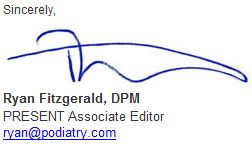
| |
|
|
HPI: The Patient is a 50-y/o female who presents to the emergency room with a painful left foot after undergoing bunion correction at an out-of-state facility approximately five months prior. The patient relates that at the time of her original surgery, the surgeon “cut the bone to fix the bunion and put a pin in to hold it in place while healing, and that the pin stuck out through the skin and was removed at about 5 weeks.”
|
 by Ryan Fitzgerald, DPM
PRESENT RI Associate Editor
by Ryan Fitzgerald, DPM
PRESENT RI Associate Editor
Washington Hospital Center
Washington, DC
|
The patient states that she also had complained of pain in her midfoot at the time of the original surgery, and that the surgeon in that case had "repaired a ligament" at that location. The patient relates that she has had a generalized ache in the left foot following the original surgery that has never truly resolved. She states that the pain is always worse with increased activity and lessons somewhat with periods of inactivity. Additionally, she complains of pain with motion of the left hallux, especially when she wears high-heel shoes, but states that she also has pain in tennis shoes.
VS: Temp: 98.1, HR: 82, RR: 18, BP: 132/82
PMH: DM, HTN
FMH: DM, CAD, HTN
PSH: Previous Left foot surgery (s/p ~5mo), Right shoulder rotator cuff repair (1999)
MEDS: Glucophage, lisinopril
ALL: Penicillin
SOCIAL: denies ETOH or illicit drug usage, relates to 25 pack year history of tobacco usage
RADIOGRAPHS: Radiographs obtained reveal nonunion of the 1st metatarsal of the left foot (fig. 1) with shortening and dorsiflexion of the distal fragment (fig. 2). |
*Click on the images below for a larger view.
|
|
|
Fig. 1: AP radiographs of the left foot demonstrates open osteotomy of the 1st metatarsal with osseous debris. Additionally there is some diastasis noted between the 1st and 2nd metatarsals at lis franc's joint. |
|
|
|
Fig. 2: Lateral radiographs demonstrate malposition and dorsiflexion of the capital fragment. |
|
|
PHYSICAL EXAM: Upon physical exam the patient demonstrates two previous healed incision sites along the dorsal-medial surface of the 1st metatarsal of the left foot (fig. 3). There is significant swelling appreciated, and pain with palpation generally along the area of the 1st metatarsal. The patient grades her pain as 6/10 currently, and states that when it is at its worst is nears 8/10. There is limitation in dorsiflexion of the left hallux and pain with range of motion – more so on dorsiflexion than plantarflexion (fig. 4). The patient demonstrates palpable DP and PT pulses that are graded +2/4. Muscle strength is +5/5 in all muscle groups tested and the patient demonstrates DTRs that are graded +2/4 at both the Achilles and patella. There are no other lesions, open or closed, which are identified.
|
Fig. 3: The patient demonstrates previous healed incisions sites at both the distal 1st metatarsal as well as in the midfoot. |
|
|
|
Fig. 4: The patient demonstrates decreased range of motion of the left hallux in dorsiflexion and relates to significant pain with palpation to the area, and with range of motion of the hallux. |
|
Considering the history, physical exam, and radiographs presented, how would you proceed with this case? Please Reply with your thought and perspectives, and we will share them in a future RI.
|
|

###
|
|
GRAND SPONSOR
This program is supported by
an
educational grant from
STRATA DIAGNOSTICS
 MAJOR SPONSORS
MAJOR SPONSORS
|
|
|
|
|
|
|
|
|
|
|
|
|
|
|
|
|
|
|
|
|
|
|
|
|
|
|
|
|
|
|
|
|
|
 |
|
|
|
|